|
|
|
Sort Order |
|
|
|
Items / Page
|
|
|
|
|
|
|
| Srl | Item |
| 1 |
ID:
183774


|
|
|
|
|
| Summary/Abstract |
Governments interact strategically with sovereign bond market creditors: they make choices not only about how often and how much to borrow, but also under what terms. The denomination of debt, in domestic or foreign currency, is a critical part of these terms. The “original sin” logic has long predicted that creditors have little appetite for developing-country government debt issued in domestic currency. Our novel data, including bond issues by 131 countries in 240,000 primary market transactions between 1990 and 2016, suggest otherwise. Domestic-denominated bonds have come to dominate the market, although domestic-currency issuance often is accompanied by shorter bond maturities. We argue that ideologically rooted policy preferences play an important role in this unexpected trend in denomination. All else equal, right governments choose foreign denomination as a means of mitigating currency risk and thus minimizing borrowing costs. In contrast, left governments opt for the flexibility of domestic denomination, and they are better able to act on their preferences in the presence of risk-mitigating monetary institutions and macroeconomic stability. We find support for our argument that partisanship has a robust and enduring relationship with denomination outcomes, even in a marketplace in which domestic-denominated developing-country sovereign bonds have become the norm.
|
|
|
|
|
|
|
|
|
|
|
|
|
|
|
|
| 2 |
ID:
121784
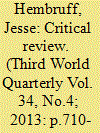

|
|
|
|
|
| Publication |
2013.
|
| Summary/Abstract |
In this article, I interrogate what is meant by 'the politics of sovereign debt', and examine how various authors, especially David Graeber, have addressed this question. More specifically, I seek to extend my contribution to the goals of the 'Repoliticizing Debt' workshop, which inspired this special issue, by proposing a theoretical framework for understanding the role of sovereign debt in mediating the contradictions of neoliberal capitalism, and by challenging dominant treatments of the sovereign debt crisis currently underway in Greece. I argue that the existing literature fails to help grasp the complexity of sovereign debt as a social relation, and that debt must be understood as what Marx refers to as 'fictitious capital', that is, capital backed not by a commodity transaction, but by a claim on future value. The management of confidence in the value of fictitious capital through the use of the 'golden noose' of debt is the key process to be understood in order to grasp the complexity of sovereign debt crises.
|
|
|
|
|
|
|
|
|
|
|
|
|
|
|
|
| 3 |
ID:
111660
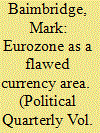

|
|
|
|
|
| Publication |
2012.
|
| Summary/Abstract |
The European single currency system has come under unprecedented strain during the past three years and there is little reason to assume that this will diminish, in any significant way, in the near future. This article briefly explores the background to the current eurozone crisis before outlining a number of potential solutions. Specifically, we discuss how the credit crunch induced recession of 2008 triggered the problems within the eurozone regarding sovereign debt, looking at the issues of spill-over and free-rider effects, together with the implementation of EMU fiscal rules. The analysis is then extended by outlining a series of potential remedies. This consists of a critical evaluation of solutions that the EU has already instigated (i.e. moral persuasion, financial relief measures and debt default), together with a series of alternative propositions (i.e. fiscal federalism and a European Clearing Union) and even the collapse of the euro.
|
|
|
|
|
|
|
|
|
|
|
|
|
|
|
|
| 4 |
ID:
141234
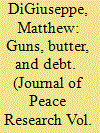

|
|
|
|
|
| Summary/Abstract |
I argue that favorable access to sovereign credit provides governments with greater autonomy to invest in security by allowing political incumbents to relax fixed-budget constraints. Borrowing permits leaders to delay and minimize the macroeconomic and redistributive costs associated with domestic sources of finance. Consequently, leaders of creditworthy states face fewer political costs when increasing military expenditure in response to growing demand or maintaining military expenditure when government revenues fall. A cross-sectional time-series analysis supports two observable implications of the argument. First, creditworthiness is positively associated with military spending with an effect on par with regime type. Second, creditworthiness conditions the effect of external threats on military expenditure, suggesting that poor credit terms constrain the provision of security.
|
|
|
|
|
|
|
|
|
|
|
|
|
|
|
|
| 5 |
ID:
147081
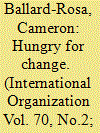

|
|
|
|
|
| Summary/Abstract |
What drives autocrats to default on their sovereign debt? This article develops the first theory of sovereign debt default in autocracies that explicitly investigates survival incentives of political actors in nondemocracies. Self-interested elites, fearful of threats to their tenure because of urban unrest, may be willing to endure the long-term borrowing costs that defaulting creates rather than risk the short-term survival costs of removing cheap food policies for urban consumers. I test my main claims that both urbanization and food imports should be associated with greater likelihood of autocratic default using panel data covering forty-three countries over fifty years, finding that autocracies that are more reliant on imported food and that are more urbanized are significantly more likely to be in default on their external sovereign debt. I emphasize the regime-contingent nature of these effects by demonstrating that they are reversed when considering democratic sovereign default. I also substantiate the mechanisms put forward in my theory through illustrative historical cases of sovereign debt default in Zambia and Peru, in which I demonstrate that fear of urban unrest in the face of rapidly increasing food prices did indeed drive autocratic elites to default on international debt obligations. In addition to providing the first political theory of debt default in autocracies, the article introduces two robust predictors of autocratic default that have been overlooked in previous work, and highlights the importance of urban-rural dynamics in nondemocratic regimes.
|
|
|
|
|
|
|
|
|
|
|
|
|
|
|
|
| 6 |
ID:
108653
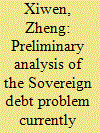

|
|
|
| 7 |
ID:
186163


|
|
|
|
|
| Summary/Abstract |
In 1979 Iraq was a net creditor to the world. Fifteen years later, its government debt-to-GDP was over 1,000 per cent. At the time of the US invasion in 2003, Iraq was saddled with around 130 billion US dollars in external debt. How does a country incur so much debt, so fast? In answering this question, the article reconstructs the build-up of Iraqi debt through the 1980s and 1990s. This article is the first to create a debt series going back to 1979. The rise in Iraqi indebtedness was a consequence of global geopolitical trends in the 1980s where political lending trumped solvency concerns. It allowed Iraq to obtain financing on terms more favourable than the US government, without conditionality of reform.
|
|
|
|
|
|
|
|
|
|
|
|
|
|
|
|
| 8 |
ID:
115316


|
|
|
| 9 |
ID:
162250
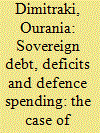

|
|
|
|
|
| Summary/Abstract |
The outbreak of the sovereign debt crisis at the end of 2009 in Greece led to a severe recession, and constant economic problems. This paper investigates military expenditure among others as a potential factor to the growth of sovereign debt in Greece over the period 1960 until currently. Our empirical findings suggest that high deficits, inflation and military spending have been the primary causes of debt growth in Greece. The structural break models reveal a much higher effect of deficits and inflation in the post-1990 period while the threshold switching regression, based on the level of sovereign debt, indicate that for levels of debt-to-GDP ratio above 90% deficits, inflation and military expenditures had significantly more pronounced effects on government debt changes.
|
|
|
|
|
|
|
|
|
|
|
|
|
|
|
|
| 10 |
ID:
189695


|
|
|
|
|
| Summary/Abstract |
Following the 2008 global financial crisis, years of low interest rates provided a rare opportunity for many developing nations to borrow in international markets—whether issuing bonds in their own currencies, securing loans from private-sector banks and commodity traders, or borrowing from China, which emerged as a dominant official creditor. Developing countries’ overall external debt rose to a record level during this period. As central banks raise interest rates sharply to counter a global rise in inflation, many of these countries are at risk of default. The mix of public and private creditors and the opacity of many loan terms make it difficult to coordinate restructuring. The key factor may be domestic politics.
|
|
|
|
|
|
|
|
|
|
|
|
|
|
|
|
|
|
|
|
|